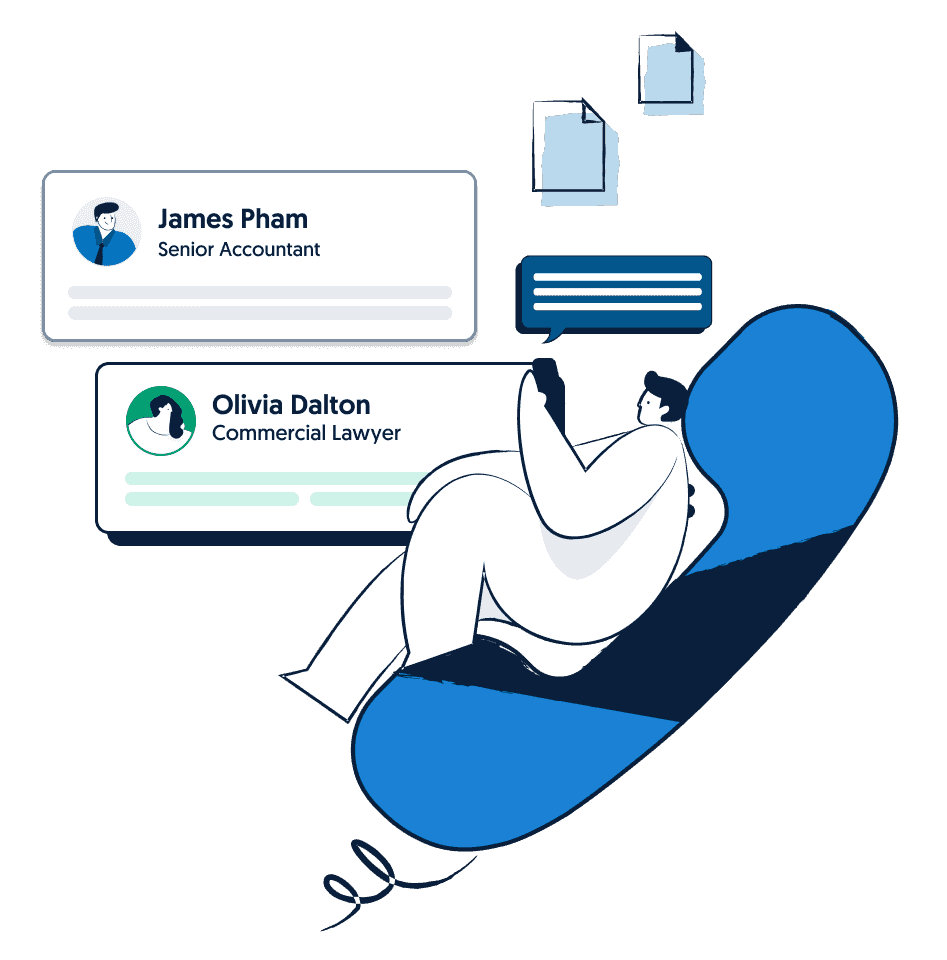Based in Sydney, Raja is a law student enrolled in a Bachelor of Laws and Bachelor of Communications (Writing and Publishing) at the University of Technology Sydney. He is passionate about transferring knowledge in relation to businesses, legal advice and marketing direction. Raja has experience working in immigration law and is driven by the writing, editing and publishing process of content.
If you are a small business owner tackling the complexities of Australia’s taxation laws, then you’ve probably worried about making mistakes on your tax documents more than once. And you’re worried for good reason!
Incorrectly claiming tax deductions can lead to compliance issues with the Australian Taxation Office (ATO). But mistakes can also lead to underclaiming, leaving your business with a higher tax bill.
Want to avoid audits and penalties while amping up your savings? Then read our guide on common tax deduction mistakes and how to avoid them!
Table of Contents
Claiming deductions without proper documentation
The right documentation is critical when it comes to claiming tax deductions with the ATO. You need to have valid receipts, invoices, or other types of records to substantiate any deductions you claim. If you fail to provide such proof during an audit, you may be disallowed claims and face potential penalties.
Example: A taxpayer claims a deduction for $1300 in work-related expenses but fails to keep any receipts. During an ATO audit, they cannot provide proof of these expenses, resulting in the disallowance of the entire claim.
To avoid this mistake, you should maintain organised records throughout the year. To do so, consider using digital tools for record-keeping. For instance, apps like myDeductions from the ATO can help track work-related expenses and general costs.
Additionally, make sure you properly understand ATO requirements. For example, there are several categories of tax claims that you can make without a receipt. This applies to things like small work-related expenses and mileage that are declared using the cents per kilometre method.

Need Financial or Legal Advice for your small business?
Misclassifying personal and business expenses
Another common error is classifying personal expenses as if they were business ones. You need to clearly distinguish between these categories because only expenses directly related to earning income are deductible. Common expenses that get misclassified include vehicle costs and home office expenses.
Example: A freelancer uses their personal vehicle for both business and personal trips but claims 100% of the vehicle expenses as business deductions. This misclassification can lead to significant penalties if audited, as only the portion used for business is deductible.
To avoid this common tax deduction mistake that small businesses make, make sure to claim only the portion of expenses you use for your business. Let’s say you use 20% of your home as your home office space — then this is the part you can claim on your tax deductions.
It is also a good idea to keep a log as proof of how you split your home, vehicle, and technology between personal and work uses.
Forgetting to claim eligible expenses
Many taxpayers overlook eligible expenses that could significantly reduce their taxable income. This is partly due to a lack of knowledge about eligible categories and the fear of overclaiming.
Commonly missed deductions include depreciation on assets, software subscriptions necessary for business operations, and costs associated with professional development.
Example: A virtual assistant forgets to claim a $200 subscription fee for software essential for their job. This oversight means they miss out on a legitimate deduction that could have reduced their taxable income.
As a small business owner, you should regularly review your business-related expenses to identify any that may qualify for deductions. You should also keep abreast of changes in Australian tax laws to make sure you don’t overlook any expenses.
Overclaiming deductions
Overclaiming deductions poses another risk for taxpayers. While underclaiming puts you at a disadvantage, overclaiming can trigger penalties if you face an audit.
For example, claiming the full cost of a new asset without adjusting for depreciation can lead to issues with the ATO. Similarly, you might overclaim expenses for items that you use for both your business and personal needs.
Example: A sole trader purchases a new laptop for $3,000, intending to use it for their business. Instead of depreciating the laptop over its effective life (typically a few years), they claim the full $3,000 as an immediate deduction in the first year. This is an overclaim because the ATO requires assets like laptops to be depreciated over time to reflect their gradual decline in value.
To avoid overclaiming, you should accurately calculate deductions based on actual business usage. Keeping detailed records is critical for proof to the ATO and proper reporting.
Incorrectly reporting employee expenses
Errors in reporting employee-related expenses are common pitfalls as well. This includes inaccuracies in claiming wages, superannuation contributions, or fringe benefits. Compliance with PAYG withholding obligations is essential to avoid penalties from the ATO.
Example: A company incorrectly reports employee superannuation contributions, underreporting them by $5,000. This error not only affects the employees’ entitlements but also leads to compliance issues with PAYG withholding obligations.
Consider the help of a registered tax agent when it comes to claiming more complex deductions, such as employee-related expenses. It can be confusing to do on your own, so it’s a good idea to have a certified professional lend a helping hand. Plus, their expertise will help you ensure compliance with all reporting obligations.
Not claiming start-up and ongoing costs correctly
Start-up costs refer to the initial expenses you incur when establishing a business. Meanwhile, ongoing costs are those that continue as you operate the business (e.g., marketing). Many taxpayers fail to gradually write off capital expenses correctly or overlook these costs altogether.
Example: A new café owner fails to write off costs related to initial marketing efforts and equipment purchases, missing out on significant tax benefits over several years due to improper accounting practices.
Proper accounting practices are essential to ensure proper claims are made. You may wish to create a detailed checklist of all potential start-up and ongoing expenses you incur. This checklist should include items like marketing, equipment purchases, professional fees, and any other relevant costs.
As you incur these expenses, document them immediately and categorise them based on whether they are start-up or ongoing costs.
🎯 Can You Claim It?
EOFY 2025 Tax Deduction Quiz - Test your deduction knowledge and see how well you know the ATO rules!
Ignoring industry-specific deductions
Certain industries have specific deductions that may not be widely known but are crucial for reducing taxable income. For example, tradespeople may claim tools as deductions, while hospitality workers might deduct uniform costs.
Example: A trady doesn’t claim deductions for tools purchased specifically for their work. By not being aware of industry-specific deductions, they lose out on valuable tax savings that could have been claimed.
If you work in an industry with special taxation allowances, make sure to read industry-specific guides by the ATO. Alternatively, consult with a tax professional who is well-acquainted with your industry to take advantage of all available deductions relevant to your field.
Don’t let these common mistakes get the better of you during the tax season. Avoid potential penalties and audits, by following the tips we have provided in this guide. A thorough understanding of tax laws, proper documentation, and, when needed, professional help, can ensure that you never make a mistake on your tax claims again.
FAQ
What are the most common tax deduction mistakes made by small businesses?
Small businesses often make mistakes such as failing to keep proper documentation, misclassifying personal versus business expenses, and overlooking eligible deductions.
Are accountants liable for tax mistakes?
Accountants may bear some responsibility for errors made in tax filings; however, clients are ultimately accountable for their own returns.
How can I ensure my tax deductions are accurate?
To ensure accuracy in your tax deductions, maintain thorough records throughout the year and consider consulting a registered tax agent for guidance on complex issues. You should also keep updated on the latest changes in ATO regulations and regularly review your business finances.
Want more?
Sign up for our newsletter and be the first to find hand-picked articles on topics that we believe are crucial to successfully scale your unique small business.
By clicking on 'Sign up to our newsletter' you are agreeing to the Lawpath Terms & Conditions
The role of registered tax agents in avoiding tax deduction mistakes
Registered tax agents play a crucial role in helping individuals and businesses navigate the complexities of Australian tax laws. These professionals are highly specialised in ATO regulations and possess industry-specific knowledge for efficient and precise tax lodgement.
How can a registered tax agent help? Their expertise ensures:
- Accurate deductions
- Proper documentation practices
- Effective audit defense strategies
- Improved tax planning
- Reduced risk of non-compliance or mistakes
- Peace of mind
Whether you are just starting out or growing your business, a registered tax agent can help you avoid common tax deduction mistakes small businesses make. They can also help you maximise your claims while ensuring full compliance with the ATO. This means more savings without the tax season stress.
Need help filing your taxes or responding to an audit? Reach out to Lawpath today to help you navigate tax claims with confidence and ease.
Don't know where to start?
Contact us on 1800 529 728 to learn more about customising legal documents, obtaining a fixed-fee quote from our network of 600+ expert lawyers or to get answers to your legal questions.








